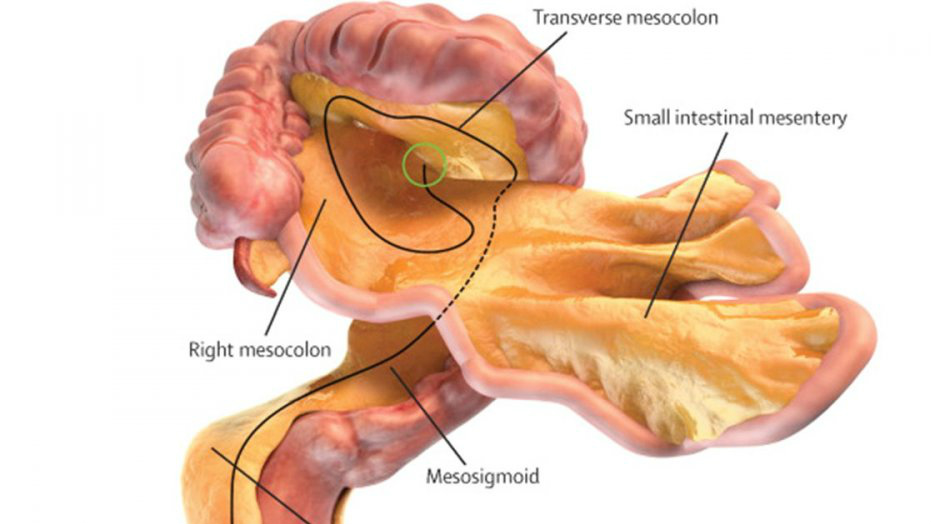Meet your 'newest' organ – the mesentery
Fatty membrane could help in battle against Crohn's disease and irritable bowel syndrome

A free daily email with the biggest news stories of the day – and the best features from TheWeek.com
You are now subscribed
Your newsletter sign-up was successful
A neglected membrane in the digestive tract may in fact be an undiscovered organ, a surgeon has claimed.
Professor J Calvin Coffey of the University of Limerick says the mesentery, a humble two-walled sheet of fatty membrane which holds the intestines in place, has been unfairly overlooked as the 79th organ in the human body, reports the Washington Post.
According to Coffey, the mesentery is a continuous structure and not a disjointed series of tissues as has been thought for more than a century.
The Week
Escape your echo chamber. Get the facts behind the news, plus analysis from multiple perspectives.

Sign up for The Week's Free Newsletters
From our morning news briefing to a weekly Good News Newsletter, get the best of The Week delivered directly to your inbox.
From our morning news briefing to a weekly Good News Newsletter, get the best of The Week delivered directly to your inbox.
"Without it you can’t live," says Coffey. "There are no reported instances of a Homo sapien living without a mesentery."
Although vital organs such as the heart, brain and lungs get most of the press, the human body has 78 organs. The mesentery would be the 79th, although it is unclear who has the last word on classifying it as such.
"That's a fascinating question. I actually don't know who the final arbiter of that is," Coffey told Discover magazine.
Leonardo da Vinci knew of the mesentery in 1508, The Independent reports, but little attention has been paid to it until recently.
A free daily email with the biggest news stories of the day – and the best features from TheWeek.com
An update to the medical textbook Gray's Anatomy in 2015 shows the membrane to be a single, folded-over band of tissue stretching from the pancreas through the small intestine and colon. It wraps around these organs, helping to hold them together and maintain their structure, although it is unclear what it does precisely, says The Smithsonian.
Coffey is optimistic that further study could reveal more about its function, as well as help improve treatment of gut illnesses such as Crohn's disease and irritable bowel syndrome.
-
 What to know before filing your own taxes for the first time
What to know before filing your own taxes for the first timethe explainer Tackle this financial milestone with confidence
-
 The biggest box office flops of the 21st century
The biggest box office flops of the 21st centuryin depth Unnecessary remakes and turgid, expensive CGI-fests highlight this list of these most notorious box-office losers
-
 The 10 most infamous abductions in modern history
The 10 most infamous abductions in modern historyin depth The taking of Savannah Guthrie’s mother, Nancy, is the latest in a long string of high-profile kidnappings
-
 Home Office worker accused of spiking mistress’s drink with abortion drug
Home Office worker accused of spiking mistress’s drink with abortion drugSpeed Read Darren Burke had failed to convince his girlfriend to terminate pregnancy
-
 In hock to Moscow: exploring Germany’s woeful energy policy
In hock to Moscow: exploring Germany’s woeful energy policySpeed Read Don’t expect Berlin to wean itself off Russian gas any time soon
-
 Were Covid restrictions dropped too soon?
Were Covid restrictions dropped too soon?Speed Read ‘Living with Covid’ is already proving problematic – just look at the travel chaos this week
-
 Inclusive Britain: a new strategy for tackling racism in the UK
Inclusive Britain: a new strategy for tackling racism in the UKSpeed Read Government has revealed action plan setting out 74 steps that ministers will take
-
 Sandy Hook families vs. Remington: a small victory over the gunmakers
Sandy Hook families vs. Remington: a small victory over the gunmakersSpeed Read Last week the families settled a lawsuit for $73m against the manufacturer
-
 Farmers vs. walkers: the battle over ‘Britain’s green and pleasant land’
Farmers vs. walkers: the battle over ‘Britain’s green and pleasant land’Speed Read Updated Countryside Code tells farmers: ‘be nice, say hello, share the space’
-
 Motherhood: why are we putting it off?
Motherhood: why are we putting it off?Speed Read Stats show around 50% of women in England and Wales now don’t have children by 30
-
 Anti-Semitism in America: a case of double standards?
Anti-Semitism in America: a case of double standards?Speed Read Officials were strikingly reluctant to link Texas synagogue attack to anti-Semitism